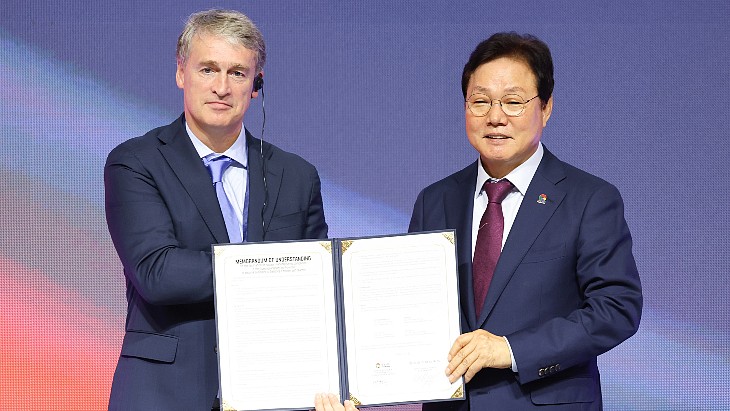_56248.jpg)
(Image: Doosan Enerbility)
X-energy of the USA - developer of the Xe-100 high temperature gas-cooled small modular reactor - has signed a reservation agreement with South Korean nuclear component designer and manufacturer Doosan Enerbility for key components for its reactors.
The agreement was signed in Washington DC on 11 December by Clay Sell, CEO of X-energy, and Jongdoo Kim, CEO of Doosan Enerbility’s Nuclear Business Group.
Under the agreement, X-energy pre-emptively secures Doosan Enerbility's forgings. Mid to large-sized forgings, which are required in the manufacturing of the main components of small modular reactors (SMRs), are materials that require a long production lead time. Follow-up agreements on commencing the manufacturing of the SMR forgings and modules are expected to subsequently take place between the two companies.
"As Doosan Enerbility is a leading global supplier of nuclear equipment, equipped with unparalleled capabilities and expertise in this area, it will play a vital role in helping us enter the global market with our Xe-100 reactors," Sell said. "We are proud to be entering into a partnership with Doosan on this major project."
Kim added: "This reservation agreement signed with X-energy is a significant milestone for us, signifying that we are now officially embarking on the manufacturing process. As X-energy's major partner responsible for supplying the main SMR components, we are committed to ensuring full support on the project by strictly adhering to the requirements for product quality and deadline."
The Xe-100 is a pebble bed high-temperature gas reactor capable of a thermal output of 200 MW or (80 MW electrical). It uses fuel made from robust TRISO (tri-structural isotropic) fuel particles which are able to withstand extremely high temperatures without melting. Optimised as a four-unit plant delivering 320 MWe, the reactor can provide baseload power to an electricity system or use its thermal output to support industrial applications with high pressure, high temperature steam.
The first deployment of the Xe-100 is planned for Dow’s Seadrift site on the Texas Gulf Coast, to supply both power and high-temperature heat to industrial-scale operations. X-energy and Amazon have also committed to the goal of more than 5 GW of new nuclear by 2039, starting with a joint plan with Washington state utility Energy Northwest to build up to 12 SMRs near Energy Northwest's Columbia Generating Station.
In August 2021, Doosan Heavy signed an engineering service contract with X-energy for studies into the manufacture of major components - including the reactor pressure vessel - for the Xe-100. Under the contract, Doosan is supporting the development of the reactor by performing a study for its optimum design in terms of manufacturability. It is also conducting mock-up tests for critical manufacturing processes.
In January 2023, Doosan Enerbility announced it was making an equity investment in X-energy, leading to further strengthening of the partnership.A strategic collaboration agreement was signed in August this year by X-energy, Amazon, Korea Hydro & Nuclear Power Corporation (KHNP) and Doosan Enerbility aimed at accelerating the deployment of X-energy's Xe-100 and TRISO-X fuel to meet growing power demands from data centres and artificial intelligence. KHNP, Doosan, and additional Korean industrial partners have agreed to support Amazon and X-energy's plans to deploy more than 5 GW of new nuclear energy across the USA by 2039. X-energy 'reserves' Doosan forgings

 (Image: South Gyeongsang province)
(Image: South Gyeongsang province)
